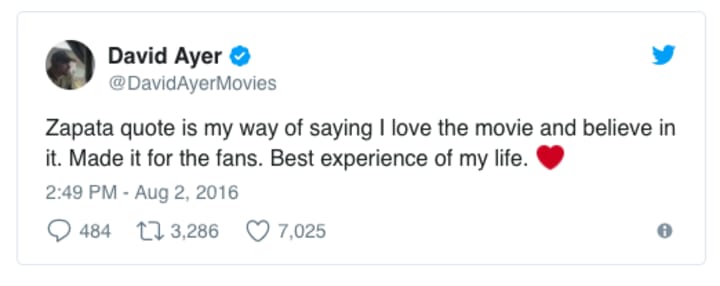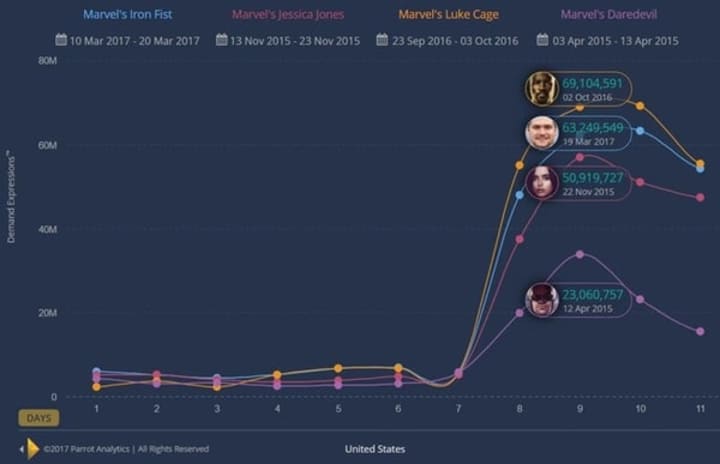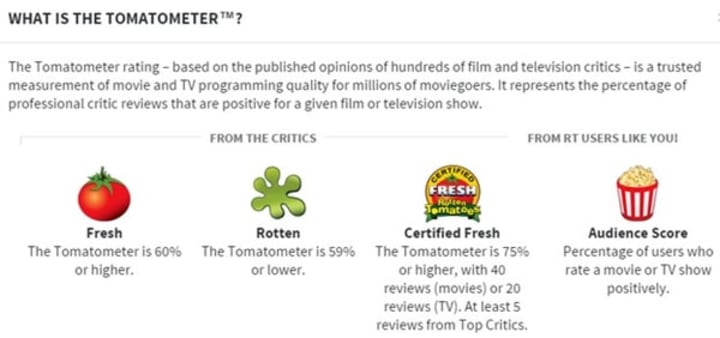
Here we go again! Last year, fans and critics were divided over Batman v Superman: Dawn of Justice, which scored a horrific 27% on Rotten Tomatoes. After Suicide Squad endured a similar reception, fans even launched a petition to shut the site down, a fact that's pretty ironic given how Warner Bros. own a 30% share in Rotten Tomatoes.
Almost exactly a year later, the pattern is repeating with Marvel's latest Netflix production, Iron Fist. Despite sagging low right now with a critical score of only 18%, Iron Fist is still performing pretty well. According to analysis of Netflix data, the fourth Defenders show has become Marvel's second-most-popular series, after Luke Cage!
- 'Iron Fist' News and All You Need to Know!
These ongoing developments lead us to wonder whether the film critics, or even Rotten Tomatoes, matter? And why are fans and critics becoming so divided?
'Made For The Fans'

Via Twitter
There's often a straight-up division between fans and critics. Studios and networks have sometimes fanned the flames by explicitly arguing that their films and shows aren't made for the critics, suggesting instead that they're 'for the fans'. This is a dangerous approach, one that I view as unwittingly insulting to both critics and fans alike. After all, it suggests both that critics can't be fans, and that fans are incapable of being critical.

Via Twitter
I have to say, though, that fan reactions aren't always helpful. Take the case of #BatmanVSuperman: Dawn of Justice. Instead of acknowledging critics' issues with the film, fans doubled-down in defense. We're seeing early signs of the same response with #IronFist, with many fans refusing to even consider the show's criticisms, including the 'whitewashing' controversy surrounding Finn Jones. (The actual issue is one of cultural appropriation, very different from whitewashing, and the fact fans conflate the two so readily suggests they haven't really taken the critics' views on board.) At worst, this leads to a sort of 'filter bubble', with critics making legitimate points, and fans essentially saying, "Nah, nah, nah, not listening."
The simple fact is that, for all the critical reception, Iron Fist is proving to be an absolute hit over on Netflix. Third-party analysis has shown that the series is performing better than Daredevil or even Jessica Jones; Comic Book Movie published a useful infographic to give you a sense of how the show's doing:

A surprising trend. [Credit: Comic Book Movie]
But these are only the most extreme examples. Take last year's #XMenApocalypse. Over on Forbes, Scott Mendelson — a well-respected industry insider — considered the film a "franchise-killing disaster". He wrote:
"Bryan Singer’s would-be trilogy capper is a shocking miss. It is a lifeless and hollow shell of a picture, lacking exciting action, strong character interplay, or compelling storytelling. It is the nadir of the franchise, determined to make you apologize for every mean thing you’ve ever said about Brett Ratner’s rushed X-Men trilogy capper a decade ago. X-Men: The Last Stand is X2: X-Men United compared to X-Men: Apocalypse."
But now contrast that with the reviews over at Newsarama, a site that remains as interested in comics as it is in movies:
"It’s as if Singer made a checklist of almost everything he knows hardcore fans really wanted to see that he either never delivered or the filmmaking tools of the time didn’t allow him to accomplish.Cooler superhero costumes – check. Storm’s accent – check. Nightcrawler a full-fledged team member – check. The core of the most beloved comic book incarnation of the team a young fighting force – check. And so on and so on. It’s a love letter to the X-Men and make-good to fans all at the same time."
You see the contrast? Singer created a love letter to the X-Men and a 'make-good' to the fans — yet critics considered the film a franchise-killing disaster.
So Do The Critics Matter?

Let's be clear, though. We'd be fools to simply dismiss the critics with a wave of our hands. Sure, we may disagree with them, but the reality is that critics are the ones who start the discussion. With the advantage of advance viewings, they pronounce judgment on the film before we get a chance to see it. Studios and networks know the power they have — otherwise they wouldn't give them early access.
At the same time though, this is often balanced out by carefully-determined embargoes. Generally, you can tell how confident a studio is in their film by the length of the embargo. In the case of Batman v Superman, the embargo was just days before release, a clear attempt at damage limitation.
At the end of the day though, this approach didn't work, kicking off a debate about whether Batman v Superman is really that bad? Fans were — and still are — locked in a defensive mode that bodes ill for the DC Extended Universe. Every bit of news is interpreted in the light of Batman v Superman's critical failure.
What About Rotten Tomatoes?

Handle with care! [Credit: Rotten Tomatoes]
It's safe to say that Brett Ratner is no fan of Rotten Tomatoes. He told the Sun Valley Film Festival:
“The worst thing that we have in today’s movie culture is Rotten Tomatoes. I think it’s the destruction of our business. I have such respect and admiration for film criticism. When I was growing up film criticism was a real art. And there was intellect that went into that. And you would read Pauline’s Kael’s reviews, or some others, and that doesn’t exist anymore. Now it’s about a number. A compounded number of how many positives vs. negatives. Now it’s about, ‘What’s your Rotten Tomatoes score?’ And that’s sad, because the Rotten Tomatoes score was so low on 'Batman v Superman' I think it put a cloud over a movie that was incredibly successful."
Of course, Ratner's company RatPac Entertainment co-financed Batman v Superman, so there's a sense in which this is just sour grapes. That said though, he does have something of a point. The Rotten Tomatoes score is arguably pretty meaningless.

Oh, dear. [Credit: Warner Bros.]
In general, the site uses an algorithm to convert reviews - which usually hold a score out of five stars - into a binary measure, 'fresh' or 'rotten'. That approach pretty much breaks down at the three-star point; convert three stars to a percentage, and you've got most critics saying a film's score should be 60%. But the algorithm treats that as the cut-off point for 'rotten', meaning a three-star score is treated exactly the same way as a one-star score. In the case of Batman v Superman, most critics gave the film three stars — 60%. Because of the nature of the algorithm, though, Rotten Tomatoes converted that to a simple score of 'rotten' — 27%.
Industry figures have even more problems with this approach. After all, these measures can't possibly match the nuances of a review, and it assumes that the star-rating is the only thing that matters. Sure, Rotten Tomatoes puts a link in to the actual review, but how many fans actually click through and read those individual reviews? Most people use Rotten Tomatoes to gain a quick idea of what the critics think by checking the score and skimming through key sentences before leaving the site.
Now, before we get too critical, it's worth noting that Rotten Tomatoes themselves encourage a different approach. In response to this article, they advised:
"At Rotten Tomatoes, we completely agree that film criticism is valuable and important, and we’re making it easier than it has ever been for fans to access potentially hundreds of professional reviews for a given film or TV show in one place. The Tomatometer score, which is the percentage of positive reviews published by professional critics, has become a useful decision-making tool for fans, but we believe it’s just a starting point for them to begin discussing, debating, and sharing their own opinions."
On this, I'm in complete agreement with Rotten Tomatoes. These algorithm sites are useful tools, but they should only ever mark the beginning of our engagement with critical reviews. The best approach for a film fan would be to use Rotten Tomatoes to find a critic whose opinion they tend to agree with, and then followthatcritic. You'll not agree with them on everything, but personally I view this as a better approach than just relying on the Tomatometer..

How RT defines the Tomatometer.[Credit: Rotten Tomatoes]
See also:
- From Sigourney Weaver's Villain To Claire Temple's Cameo: How 'Iron Fist' Sets Up 'The Defenders'
- Ranking Marvel's Defenders On Netflix, From 'Daredevil' To 'Iron Fist'!
- 'Daredevil''s Charlie Cox Reveals Where 'The Defenders' Is Set In The MCU Chronology
Ultimately, this debate is unlikely to go away anytime soon. Aggregate sites like Rotten Tomatoes are making it very clear that there's a division between fans and critics — one that, unwisely, is being encouraged by studios and networks.
Personally, I view this kind of division as dangerous, setting fans and critics against one another as enemies, which ultimately works as an insult to both groups. I'd caution fans that there's an urgent need to engage with critical discussion, not just to dismiss it. However, I'd also encourage critics to go out there and spend time with the fans, to understand the passion and enthusiasm of fan groups. The solution isn't simply to entrench division; it's to try and bridge the gulf.
(Sources: ComicBookMovie, Forbes, Newsarama; Poll Image Credit: Netflix)
About the Creator
Tom Bacon
A prolific writer and film fan, Tom has a deep love of the superhero genre.






Comments
There are no comments for this story
Be the first to respond and start the conversation.